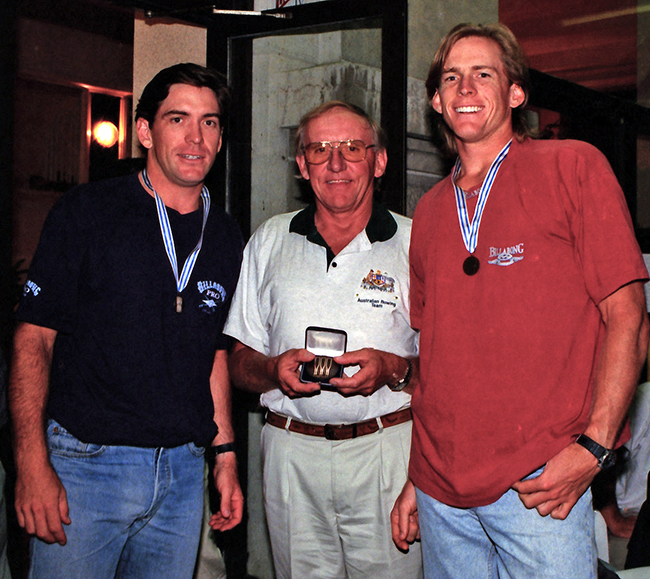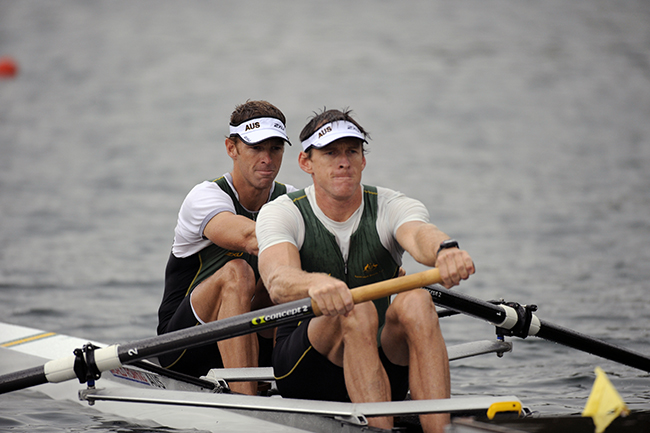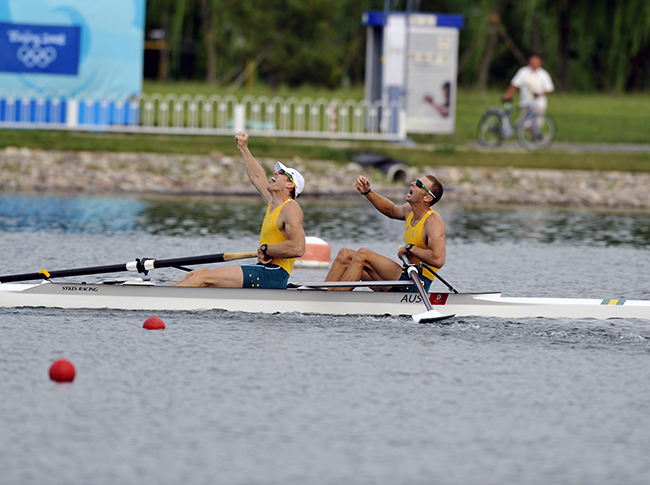Duncan Free
This page is under construction
Bond University (QLD), Tweed Heads Rowing Club (QLD) and Griffith University Boat Club (QLD)
Duncan Free, a proud rower from Queensland, is one of the most versatile and accomplished athletes in the history of Australian rowing. Over the course of his distinguished career, Free excelled in multiple boat classes, ranging from the single scull to the coxless four, earning a reputation for both his technical skill and his leadership on the water. His career is marked by impressive National Championship victories, World Cup podiums, and Olympic success, making him a key figure in Australian rowing and a true inspiration for aspiring athletes.
Duncan Free’s rowing career took off at a young age, no doubt encouraged by his father Reg Free, an international rower and his brother Marcus, also a rower. In 1991, he won the National Championship in the Under 19 Men’s Single Scull, a result that showcased his early potential and set the tone for his future successes. That same year, he went on to represent Australia at the World Rowing Junior Championships, where he earned a commendable second-place finish in the Men’s Single Scull. This early taste of international competition laid the foundation for Free’s future achievements on the world stage.
The following year, Free continued to build on his success. In 1992, he claimed the National Championship title in the Under 23 Men’s Single Scull, marking his transition to more senior-level competition. Free’s consistent performances quickly established him as one of Australia’s rising stars in the sport of rowing.
In 1993, Free began competing at the World Rowing Cup level, where he faced tougher competition. At World Rowing Cup II, he finished seventh in the Men’s Single Scull, showing that while he was still in the process of refining his technique, he could compete at the highest levels.
By 1994, Free had established himself as a true all-rounder, winning the National Championship in the Men’s Quadruple Sculls. This victory would mark the beginning of a long and successful career in the quad, a boat class in which he would go on to achieve considerable success. Free also represented Australia at the World Rowing Championships that year, where his crew finished a respectable fourth in the Men’s Quadruple Sculls, narrowly missing out on a medal.
The late 1990s saw Free continue to develop as a world-class rower. In 1995, he once again dominated at the National Championships, winning the Men’s Quadruple Sculls title. However, his results at the World Rowing Championships that year weren’t as successful, with his crew finishing in eighth place in the Men’s Quadruple Sculls. This result did little to dampen Free’s spirit, though, as he was determined to return to the podium in future international competitions.
In 1996, Free reached a pivotal moment in his career. At the Atlanta Olympic Games, he and his crew earned a bronze medal in the Men’s Quadruple Sculls, marking his first Olympic medal. The achievement was not only a personal triumph for Free but also a significant milestone for Australian rowing, as it underscored the growing strength of the country's rowing program.
Free’s success continued into 1997 in a season of great joy for the Free family. Duncan raced with his brother Marcus and they were coached by their father Reg. They won National Championship titles in both the Men’s Double Scull and Men’s Quadruple Sculls. Duncan also triumphed in the prestigious Interstate Sculling President’s Cup, a title he would go on to win several times throughout his career. Internationally, the Free brothers earned podium finishes in World Rowing Cup II and III, securing third and second-place results in the Men’s Double Scull, respectively. Their continued success on the international stage culminated in a third-place finish in the Men’s Double Scull at the 1997 World Rowing Championships. It solidifying his status as one of the world's best rowers.

A great day for the Free family at 1997 World Championships - Men's Double of Marcus Free, Reg Free (coach) and Duncan Free
Free’s 1998 season was marked by more National Championship titles in the Men’s Single Scull, Men’s Quadruple Sculls, and Interstate Sculling President’s Cup. Despite finishing tenth in the Men’s Double Scull at the 1998 World Rowing Championships, Free remained determined and focused on the coming years, continuing to refine his technique and expand his skill set.
The turn of the millennium saw Duncan Free at the height of his powers. In 1999, he won yet another National Championship in the Men’s Double Scull, as well as the Interstate Sculling President’s Cup. On the international front, Free and his crew earned a bronze medal in the Men’s Quadruple Sculls at the 1999 World Rowing Championships, a remarkable achievement that added to his growing legacy.
In 2000, Free’s success reached new heights. He triumphed in the Men’s Single Scull, Men’s Double Scull, and Men’s Quadruple Sculls at the National Championships, further cementing his reputation as a dominant force in Australian rowing. He also competed in the Sydney Olympic Games, where he and his crew finished fourth in the Men’s Quadruple Sculls, narrowly missing out on a medal. Despite the disappointment of finishing just outside the medal positions, Free’s performances that year were a testament to his strength, focus, and resilience.
In 2001, Free continued his streak of National Championship victories, winning titles in the Men’s Single Scull and the Interstate Sculling President’s Cup. At the World Rowing Championships, Free finished fourth in the Men’s Single Scull, once again just missing out on a podium finish. Despite this, Free’s consistency and ability to challenge for medals continued to make him one of the top rowers in the world.
The following year, in 2002, Free dominated at the National Championships once again, taking home gold in the Men’s Single Scull, Men’s Quadruple Sculls, and the Interstate Sculling President’s Cup. Internationally, he faced tough competition but was consistently near the top, finishing fifth and seventh at the World Rowing Cups in the Men’s Single Scull.
In 2003, Free continued his dominance on the national stage, winning titles in the Men’s Single Scull and the Interstate Sculling President’s Cup. At the World Rowing Championships that year, he finished a strong fifth in the Men’s Single Scull. His performances indicated that he was primed for even greater success in the coming seasons.
The 2004 season was a defining one in Free’s career. He once again won National Championships in the Men’s Single Scull, Men’s Quadruple Sculls, and the Interstate Sculling President’s Cup. At the Athens Olympics, Free and his crew finished seventh in the Men’s Quadruple Sculls, but it was his continued presence at the top of international rowing that proved his enduring excellence.
In 2006, Free joined with Drew Ginn in the Australian Men’s Pair to victory at the World Rowing Cup II and the World Rowing Championships, claiming the gold medal and cementing his place as one of the world’s premier sweep rowers. This victory was a testament to his versatility and ability to excel in both sculling and sweep rowing.
Free’s success continued into 2007, where he claimed National Championship titles in both the Men’s Coxless Pair and Men’s Coxless Four. He also triumphed at the World Rowing Championships, winning gold in the Men’s Coxless Pair. The 2008 season was another banner year for Free, with more National Championship victories in the Men’s Coxless Pair, Coxless Four, and Men’s Quadruple Sculls. His crowning achievement came at the Beijing Olympics, where Free and his crew won a gold medal in the Men’s Coxless Four, securing his place in Olympic history.
The Beijing Olympic Games was both the highlight of his career and also his most nerve racking regatta. He and his pair partner Drew Ginn entered the regatta as firm favourites for gold. However, Drew's back, which collapsed before the 2000 Games, again collapsed at this regatta. He was unable to row between heat and semi final and between semi final and final. At the regatta, neither of them knew if Drew would be capable of racing the final. The team reserve was waiting at the start for a last minute change should Drew not survive the warm up. FISA had in anticipation approved, if required, a last minute change. Duncan's long fought after dream of Olympic gold was potentially in tatters. The crew stayed away from the rest of the team to avoid any news of the injury leaking out and any undue focus by the rest of the team on Drew and Duncan. The tension of waiting and wondering was enormous. To the great credit of all involved, the crew remained unchanged. Drew survived the final to row a flawless race with enormous suffering. The relief of the crew becoming Olympic Champions was palpable. Drew returned to Australia for an operation on his back and Duncan returned in triumph.

Ginn and Free in 2008 racing at World Cups

The relief and joy in equal measure after winning at the Olympic Games
In his final years of competition, Free’s performances remained impressive. In 2010, he finished fourteenth at the World Rowing Championships in the Men’s Single Scull, showing that even as he neared the end of his career, he was still competitive at the highest level. In 2011, he won National Championship titles in the Men’s Coxless Four, capping off a long and illustrious career with another taste of victory on home soil.
Duncan Free’s career in Australian rowing is defined by his unwavering dedication, remarkable versatility, and exceptional leadership. From his early triumphs in the single scull to his Olympic gold in the coxless four, Free's legacy in the sport will continue as he inspires future generations of rowers as a club and national level coach. His commitment to excellence and passion for the sport continues.
Some rowing highlights
1991 National Championship Under 19 Men’s Single Scull – First
1991 World Rowing Junior Championships Men’s Single Scull – Second
1992 National Championship Under 23 Men’s Single Scull – First
1993 World Rowing Cup II Men’s Single Scull – Seventh
1994 National Championship Men’s Quadruple Sculls – First
1994 World Rowing Championship Men’s Quadruple Sculls – Fourth
1995 National Championship Men’s Quadruple Sculls – First
1995 World Rowing Championship Men’s Quadruple Sculls – Eighth
1996 National Championship Men’s Double Scull – First
1996 National Championship Men’s Quadruple Sculls – First
1996 Atlanta Olympic Games Men’s Quadruple Sculls – Third
1997 National Championship Men’s Double Scull – First
1997 National Championship Men’s Quadruple Sculls – First
1997 National Championship Interstate sculling President's Cup – First
1997 World Rowing Cup II Men’s Double Scull – Third
1997 World Rowing Cup III Men’s Double Scull – Second
1997 World Rowing Championship Men’s Double Scull – Third
1998 National Championship Men’s Single Scull – First
1998 National Championship Men’s Quadruple Sculls – First
1998 National Championship Interstate sculling President's Cup – First
1998 World Rowing Cup III Men’s Double Scull – Fifth
1998 World Rowing Championship Men’s Double Scull – Tenth
1999 National Championship Men’s Double Scull – First
1999 National Championship Interstate sculling President's Cup – First
1999 World Rowing Championship Men’s Quadruple Sculls – Third
2000 National Championship Men’s Single Scull – First
2000 National Championship Men’s Double Scull – First
2000 National Championship Men’s Quadruple Sculls – First
2000 World Rowing Cup II Men’s Quadruple Sculls – Fourth
2000 Sydney Olympic Games Men’s Quadruple Sculls – Fourth
2001 National Championship Men’s Single Scull – First
2001 National Championship Interstate sculling President's Cup – First
2001 World Rowing Cup IV Men’s Single Scull – Fourth
2001 World Rowing Championship Men’s Single Scull – Fourth
2002 National Championship Men’s Single Scull – First
2002 National Championship Men’s Quadruple Sculls – First
2002 National Championship Interstate sculling President's Cup – First
2002 World Rowing Cup II Men’s Single Scull – Seventh
2002 World Rowing Cup III Men’s Single Scull – Fifth
2003 National Championship Men’s Single Scull – First
2003 National Championship Interstate sculling President's Cup – First
2003 World Rowing Cup III Men’s Single Scull – Fifth
2003 World Rowing Championship Men’s Single Scull – Fifth
2004 National Championship Men’s Single Scull – First
2004 National Championship Men’s Quadruple Sculls – First
2004 National Championship Interstate sculling President's Cup – First
2004 World Rowing Cup III Men’s Quadruple Sculls – First
2004 Athens Olympic Games Men’s Quadruple Sculls – Seventh
2006 National Championship Men’s Coxless Four – First
2006 World Rowing Cup II Men’s Coxless Pair – First
2006 World Rowing Championship Men’s Coxless Pair – First
2007 National Championship Men’s Coxless Pair - First
2007 National Championship Men’s Coxless Four – First
2007 World Rowing Cup III Men’s Coxless Pair – First
2007 World Rowing Championship Men’s Coxless Pair – First
2008 National Championship Men’s Coxless Pair - First
2008 National Championship Men’s Coxless Four – First
2008 National Championship Men’s Quadruple Sculls – First
2008 World Rowing Cup II Men’s Coxless Pair – Third
2008 Beijing Olympic Games Men’s Coxless Four – First
2010 World Rowing Championship Men’s Single Scull – Fourteenth
2011 National Championship Men’s Coxless Four – First
2012 World Rowing Cup III Men’s Coxless Pair – DNS
Jack Hargreaves
January 2025

